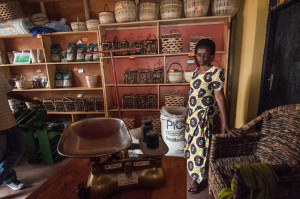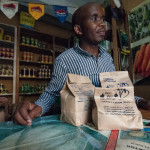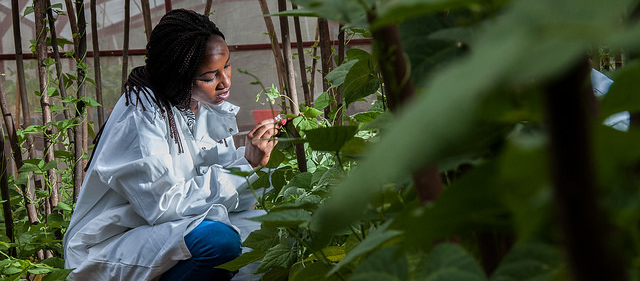Ellen Tuyisenga (pictured below) has the answer. It came to her one day in the field, as she talked with friends about earnings from the previous bean harvest. One lady recounted that she had made more than US$1,000. Then her husband took the money away, leaving her with nothing.
 “I saw how hard the women worked, but they could not make decisions,” she said. “This story added to my frustration. I made a promise to myself that I would form a company, so that as women, we can make decisions and open our own bank account. I wanted to demonstrate that it can be done.”
“I saw how hard the women worked, but they could not make decisions,” she said. “This story added to my frustration. I made a promise to myself that I would form a company, so that as women, we can make decisions and open our own bank account. I wanted to demonstrate that it can be done.”
With support from her husband, she formed the Ibisubizo cooperative, whose name means “the answer.” Today, she is president of Ibisubizo in the hilltop town of Musanze, northern Rwanda. More than 500 other smallholder farmers have the answer too.
While the cooperative’s shelves are stacked high with different bean varieties, 80 percent of its business consists of supplying high-yield climbing beans, particularly those with increased levels of iron and zinc. “Our motto is one field, one variety; one bag, one variety,” Ellen says, weighing out beans for a growing queue of customers.
One farmer, who buys climbing beans – the type that climb up stakes like a vine – says she buys beans here to feed her family of four, selling surplus production back to the shop for a profit. “I come here because I know these seeds are all the same variety,” she says. “If I go to the market, the beans are mixed.”
One bag, one variety
If the farmer plants beans from the market, she gets only four or five kilograms, and she doesn’t know what varieties could be in the bag she is sold. If she buys a sack of climbing beans from Ibisubizo, her yield is around ten kilograms per harvest – that usually puts twice as much money in her pocket.
In Rwanda, farm sizes are declining, as population increases: By 2100, the country’s population of 12 million is projected to reach more than 40 million. Agriculture is the backbone of the economy, and beans are the leading staple grain legume, accounting for 25 percent of crop land use.
Beans are also among Rwanda’s top commercial crops, constituting 78 percent of total pulse production and contributing importantly to diets, nutrition, and income security. High-yield climbing bean varieties – like those sold by Ibisubizo – are two to three times more productive than other varieties.
Today, improved climbing beans are planted on more than half of the country’s bean production area, representing a 45 percent increase since 1985.
In the last decade, the country has been transformed from a net importer to an exporter – with exports valued at US$12- 20 million – and increased yields from 0.7 to 1.1 tons per hectare.
Through information-sharing platforms set up by the Rwanda Agricultural Board (RAB) – where groups like Ibisubizo are at the table – women’s participation in decision-making has increased by 38 percent.
“In Rwanda, everybody consumes beans on a daily basis – even at every meal,” says Augustine Musoni, head of RAB’s Legume and Oil Crops Program. Beans contribute 13,200-22,000 tons of protein per year to local diets.
“Rwanda has made a breakthrough with climbing beans in terms of the number of farmers growing them. Partnerships make the system strong: with development and research partners as well as farmers.”
Being at the table
RAB fosters collaboration between farmers, cooperative groups, the small but growing private sector, research organizations, universities, traders, and international agencies – supported by the Pan African Bean Research Alliance (PABRA).
 It is through RAB – and PABRA – that Tuyisenge first heard about “innovation platforms.” These involve regular meetings, in which key decision-makers across bean processors at all levels, discuss improvements or challenges in delivering better beans to farmers.
It is through RAB – and PABRA – that Tuyisenge first heard about “innovation platforms.” These involve regular meetings, in which key decision-makers across bean processors at all levels, discuss improvements or challenges in delivering better beans to farmers.
The PABRA network connects, seed multiplication companies with national breeders. Since both are network members, multiplication companies have access to high-quality, high-yielding bean varieties from RAB without investing in costly and long-term breeding programs.
Rwanda’s national bean program can multiply breeder seed on a scale that would not otherwise be possible. And, Ibisubizo remains stocked full of quality-assured RAB beans.
Given that few farmers have access to certified seed – only 3-5 percent in some regions of Africa. Providing farmers with high-yielding, disease-resistant beans is a high priority for researchers.
Through stronger partnerships forged by PABRA members, farmers – like those supplied by Ibisubizo – get both higher quality beans and better access to them.
Download the case study on Rwanda: Climbing to new heights
The Pan-Africa Bean Research Alliance (PABRA) is coordinated by CIAT, bringing together those who trade, grow, and are involved at all stages of bean production. Partners in this research work include Catholic Relief Services (CRS), Win Win Agritech Ltd and the CGIAR HarvestPlus Program.
Photo credits: Georgina Smith / CIAT.
Full photo album here
This story was written by Georgina Smith / CIAT and was first published on the CIAT blog on 17 November 2015.

